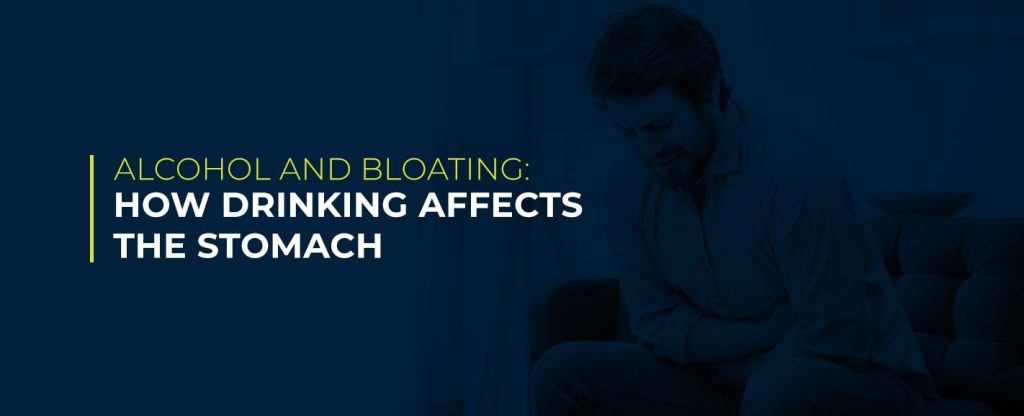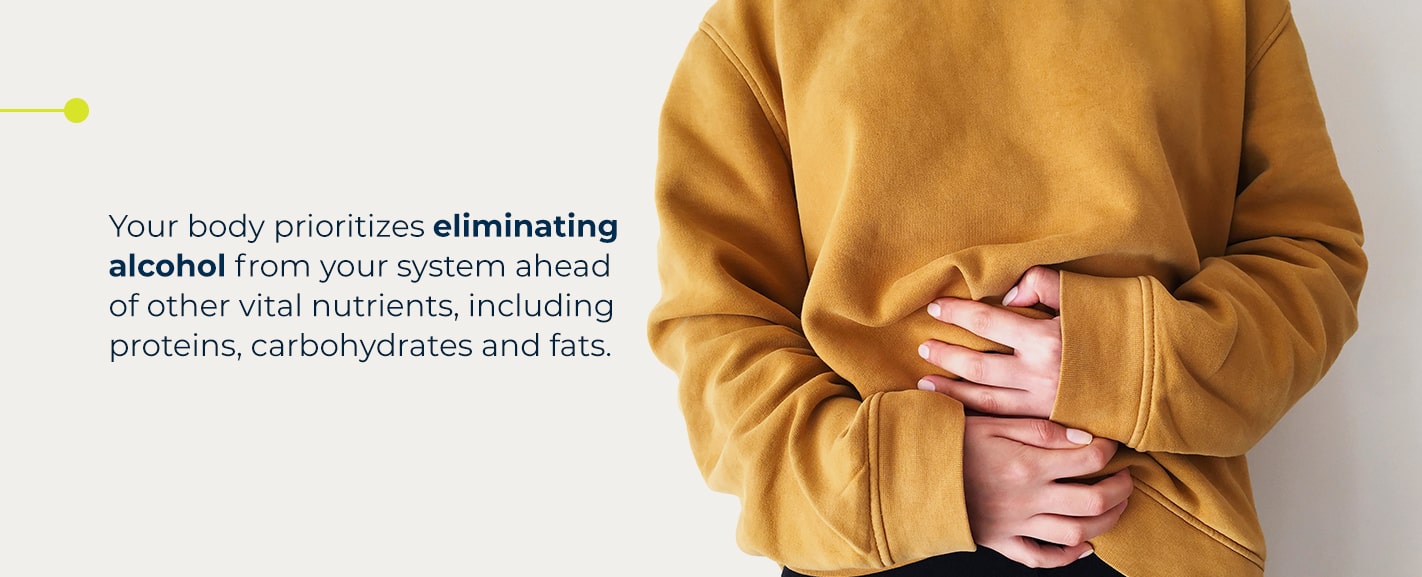- Dec 10
- AddictionAlcohol Addiction Treatment

After drinking alcohol, you may have noticed concerns like stomach pain, discomfort or bloating. While occasional abdominal bloating is normal, alcohol-related abdominal bloating may cause more uncomfortable symptoms and indicate other medical conditions or complications.
To improve alcohol-related stomach bloating and discomfort, you must first understand how your digestive system processes alcohol.
How Alcohol Affects Your Digestive System
Your digestive system includes the mouth, throat, esophagus, stomach, liver, small intestine and large intestine. The digestive system’s job is to properly process food and nutrients and ensure potentially harmful bacteria or substances are safely neutralized and removed from the body. When you drink alcoholic beverages, your digestive tract tries to process alcohol more quickly because it has damaging effects on the digestive system. Excessive or chronic alcohol consumption can cause damage to various aspects of the digestive tract and increase your risk of developing medical complications.
Mouth and Throat
When alcohol is introduced to the body, it quickly enters the saliva of your mouth and begins being converted to acetaldehyde, a probable carcinogen. This chemical can damage the sensitive soft tissues of your mouth and throat. Research has found that excessive alcohol consumption is the second largest risk factor in developing oral cancer. If alcohol consumption is combined with tobacco use or smoking, this can also greatly increase the risk of developing oral cancer.
Esophagus
Your esophagus is the long tube that runs from your throat to the stomach. Alcohol can damage esophagus cells and cause acid reflux, further irritating the cells. In cases of frequent alcohol use, the damage to the esophageal cells is worse and often leads to a higher risk of developing esophageal cancer. Alcohol consumption increases your risk of throat cancer, larynx cancer and esophageal cancer.
Stomach
Compared to the mouth, throat and esophagus, the stomach is where alcohol spends more time being absorbed by the bloodstream. Any amount of alcohol consumption can interfere with proper stomach functioning and is likely to cause stomach pain after drinking. Alcohol can interrupt the production of necessary stomach acids, causing the stomach to be less effective at destroying harmful bacteria. If the stomach cannot effectively neutralize harmful bacteria, it may enter your small intestine.
Alcohol can also cause damage to the mucous cells designed to protect your stomach wall from being damaged by digestive enzymes and stomach acid. Without proper protection, the stomach line may be more prone to inflammation or lesions.
Liver
Your liver helps remove toxins from the body. The liver processes alcohol in multiple ways, but all of these forms lead to alcohol being converted to acetaldehyde. This compound damages cells of the liver and can cause inflammation and irritation. Extensive alcohol intake can cause fatty liver disease to develop, further damaging the liver. In many cases, fatty liver disease is one of the earliest stages of alcohol-related liver disease. If alcohol is continually misused, you may be at a higher risk of developing alcoholic hepatitis or cirrhosis.
Intestines
After the stomach, undigested food then passes through the small intestine, making its way to the large intestine. The intestines are the last step in your body’s cycle of processing food and nutrients. Alcohol reaches your large intestine by being absorbed into the bloodstream, damaging the intestines. Research has found that continual or excessive alcohol consumption can increase the risk of colon cancer and rectal cancer.
How Your Digestive System Processes Alcohol
Your stomach does not treat alcohol as it would a traditional nutrient found in food. Your body prioritizes eliminating alcohol from your system ahead of other vital nutrients, including proteins, carbohydrates and fats. Unlike traditional nutrients, alcohol is absorbed directly into the bloodstream. When ingested, alcohol can prevent your stomach from properly absorbing vital nutrients.
How Can Alcohol Damage the Digestive System?
Alcohol can negatively affect your digestive system in several ways. Many people commonly experience alcohol-related stomach pain, as alcohol and indigestion can cause an upset stomach and abdominal bloating. Along with those concerns, alcohol consumption can cause:
Gastritis
Gastritis is when the stomach lining becomes irritated and inflamed. Gastritis can be either acute or chronic, meaning it is a short-term or long-term condition. Alcohol-related gastritis is when the presence of alcohol in your digestive tract irritates and damages the stomach lining. Common symptoms of alcohol-related gastritis include stomach pain, appetite loss, nausea and vomiting. If you do not seek proper treatment for chronic gastritis, you may be at a higher risk of developing stomach ulcers.
Enlarged Esophageal Veins
Alcohol consumption can cause the veins of the esophagus to become enlarged and prone to bleeding. Enlarged esophageal veins often develop on the lower parts of the esophagus and are usually caused by alcohol-related cirrhosis. Enlarged esophageal veins are known as esophageal varices.
Common in people who have been diagnosed with serious liver diseases, enlarged esophageal veins develop when the normal blood flow to the liver is blocked by scar tissue or a clot. Your body then redirects the blood flow through smaller blood vessels that are not designed to carry large amounts of blood. This added strain on small blood vessels can make them more likely to bleed, rupture or become damaged, causing potentially life-threatening medical complications.
Ulcers
Alcohol can cause ulcers to develop, which are open sores that form in the lining of the stomach, esophagus or small intestine. Alcohol consumption can damage the protective mucus that lines the stomach. Without proper protection, the stomach lining can become damaged due to stomach acid irritating the tissue, causing an ulcer to develop. Stomach ulcers may cause abdominal pain, bloating or a burning sensation in the abdomen.
Cancer
Alcohol is known to be a carcinogen and can increase the risk of developing cancer. Research has shown that drinking alcohol increases your cancer risk for diseases such as:
- Esophageal cancer
- Throat cancer
- Liver cancer
- Colorectal cancer
How Long Does Alcohol Bloating Last?
Alcohol bloating may last a few days or even a few weeks, depending on what is causing the irritation and inflammation. The length of time it takes for the effects of alcohol on a bloated stomach to improve depends on how regularly you consume alcohol and the extent of your bloating. Acute gastritis only causes bloating to persist for a short amount of time. In most cases, acute gastritis improves in just a few days.
On the other hand, chronic gastritis may cause bloating and related symptoms to persist for weeks or even months. Symptoms of chronic gastritis may be less noticeable and take a longer time to develop. Reducing alcohol consumption can be an effective way to manage alcohol-related gastritis and stomach bloating.
Seek Alcohol Addiction Treatment at Gateway Foundation
Gateway Foundation is a leading provider of evidence-based treatments to help overcome alcohol dependency. We are proud to offer medication-assisted treatment, cognitive behavioral therapy, mindfulness-based sobriety and many more innovative treatments to take a personalized approach and help our patients find relief from alcohol addiction. Our team of caring and compassionate experts dedicate themselves to helping each and every one of our patients through their life-long recovery journey.
To learn more about addiction medicine and alcohol dependency treatments we offer, contact us online today or call Gateway Foundation at 877.381.6538 and get the support you need to lead a healthy, sober life.




